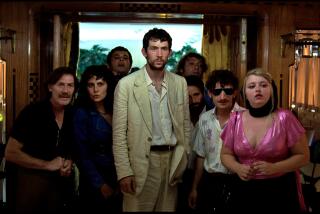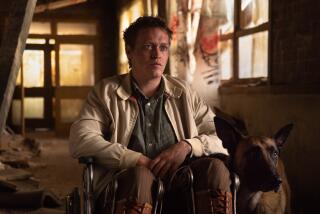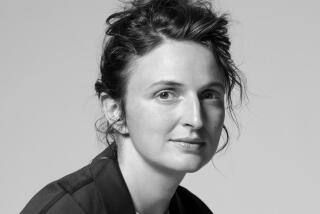Tyne Daly plays a mama scorned in ‘Agamemnon’
WHEN IT comes to pursuing the bad guys, few actors move mountains like Tyne Daly. For years on television she huffed and puffed after crooks as a New York City cop on “Cagney & Lacey.” More recently, as a social worker on “Judging Amy,” she battled for needy children while making sure her own gavel-pounding daughter never lost sight of what was really at stake in her courtroom. But playing Clytaemnestra in the Getty Villa’s new staging of Aeschylus’ “Agamemnon” brings this righteous fury to what can confidently be called its tragic apex.
In the midst of a recent late afternoon rehearsal at the Villa’s Roman paradise near Malibu, Daly took a break to talk about her latest challenge: transforming one of literature’s archetypal female villains -- an adulterous wife who ruthlessly stabs her royal husband to death -- into a woman hounded by a grievous loss and obsessed with retribution.
“Homer didn’t give Clytaemnestra a break,” Daly says, her eyes ablaze with ancient texts and modern interpretation. “He never even mentions the fact that her child had been sacrificed to get this war in Troy going.”
Aeschylus, on the other hand, provides what Daly calls “a compelling motive” for the murder of King Agamemnon (played here by Delroy Lindo). As she explains it, Clytaemnestra is charged with “an assignment by the gods” to punish the man who killed her daughter Iphigenia, and this treacherously plotting mother won’t rest until the crime has been religiously avenged.
No wonder Daly, who has witnessed more than her share of TV homicides, refers to this first part of Aeschylus’ “Oresteia” trilogy as a “barnburner.” Eager as she is to explore Clytaemnestra’s neglected humanity, the crackling tension of the tale visibly thrills her.
The production, which opens Thursday at the Villa’s outdoor Barbara and Lawrence Fleischman Theater under the direction of Stephen Wadsworth, strives for clarity while avoiding melodramatic simplification. The goal is admirable, but this dense poetic tragedy from 458 BC has a stylistic remoteness that has been exceedingly difficult to figure out on the contemporary stage.
Wadsworth says he has adapted Robert Fagles’ translation not to diminish the play’s archaic strangeness but to make its narrative paths more accessible. “Aeschylus presumed a tremendous knowledge of the subtleties of the back story in the Athenian theatergoing public, which we do not have,” explains Wadsworth, whose approach (in addition to sorting out the family meshugas) offers a new lens through which to view Clytaemnestra more sympathetically.
For her part, Daly has been busy schooling herself in ancient Greek culture,something easy to do at the Getty’s artifact-crammed galleries. She has also been comparing translations and reading the “Iliad” and “The Odyssey,” which she says she “pooped out on in college.” Her motto: “The one who imagines it best wins.”
Since moving to New York after “Judging Amy” went off the air in 2005, Daly has had more time to devote to the theater. She received a Tony nomination for her performance in David Lindsay-Abaire’s Pulitzer Prize-winning drama “Rabbit Hole” and in January starred in Edward Albee’s new play, “Me, Myself & I,” at the McCarter Theatre in Princeton, N.J.
“I haven’t talked to the press in a number of years,” she says in her customary matter-of-fact, mile-a-minute manner. “I needed to rest from a lot of things at the end of ‘Judging Amy.’ I got rid of all sorts of machines, like televisions, faxes and copiers. I wanted to investigate New York from a very private place.”
Why break the silence now? “This one needs talking about,” she says. “I’ve tried to make theater in L.A. for 25 years or more. There’s a pretty healthy theater scene, but I think we can suffer a bit from it being an audition town. This is also a daytime town, and it can be a struggle to get people to come at night and stay past 9:30.”
Daly is part of a select group of actresses who haven’t let success on the small screen keep them from taking risks on stage. Like Jean Stapleton, Charlotte Rae, Michael Learned and S. Epatha Merkerson, Daly has turned to the theater to break free from the kind of typecasting TV stardom encourages.
“For me, the trip of being an actor is to play all kinds of people,” she says. “But in the business of show, producers love to say, ‘Oh, please do that thing you did before that made us so much money.’ So to deviate from your assigned slot can be upsetting to some.”
Hailing from an acting family, Daly is grateful to her parents, James Daly and Hope Newell, for instilling in her the value of this work. “It’s hard not to sound full of yourself, but indeed if you don’t set it up to be a great deal, it can’t possibly be an OK deal. Even when I get the deep blues, I hold on to this notion that acting is a useful activity. We love stories about ourselves. . . . It’s one of the things that defines us as human beings.”
A lesson that has been particularly valuable in tackling Clytaemnestra harks back to a production she did at the Mark Taper Forum in 1978. Daly was portraying the wife of a Nazi war criminal in Michael Cristofer’s “Black Angel.” As she recollects, “One day in rehearsal, Gordon Davidson said to me, ‘Would you quit judging this character and just play her?’ ”
This advice may have helped Daly win the Tony for her gritty working-class portrayal of Momma Rose in the 1989 Broadway revival of “Gypsy.” “Rose is considered the archetypal stage mother, who’s impossible, loud and ruinous,” she says. “But I don’t think that’s the way you approach her as a performer. People take action when they think they’re in the right or that they’re correct or that it’s absolutely necessary. Rose steals her dad’s plaque and hocks it to get her kids out of Seattle.”
Aeschylus furnishes a dizzying array of competing perspectives on Clytaemnestra, which is part of the puzzle that has drawn actors to the role for centuries.
Daly’s long and distinguished career (freighted with six Emmys) has detoured around the classics, but as a self-described “adventure junkie,” she seems ready for the test of playing a woman who is both a seeker of moral resolution and a contributor to the moral chaos swamping her family.
“For an actor, if you’re lucky, the first 10 or 15 years you’re the victim,” Daly says.
“Then you get to be the hero for a little while (which I did and it was extraordinary), and after that you get to be the villain.
Thinking again, she adds: “Of course, the hero of the play is whoever you’re playing.”
“Agamemnon,” Getty Villa, 17985 Pacific Coast Highway, Pacific Palisades. 8 p.m. Thursdays through Saturdays, through Sept. 27. $38 ($32 students/seniors). (310) 440-7300 or www.getty.edu.
More to Read
The biggest entertainment stories
Get our big stories about Hollywood, film, television, music, arts, culture and more right in your inbox as soon as they publish.
You may occasionally receive promotional content from the Los Angeles Times.







